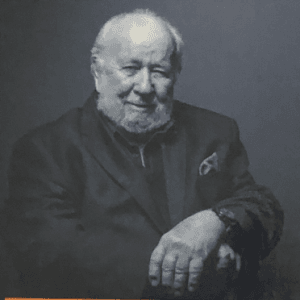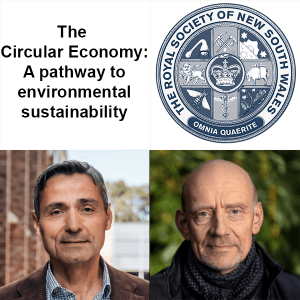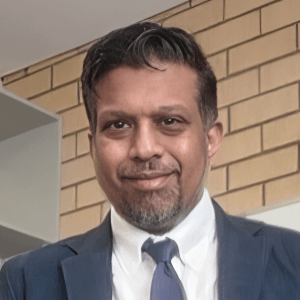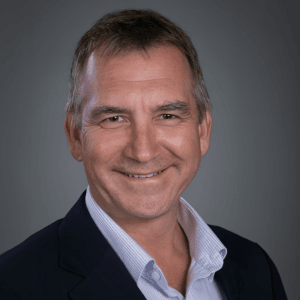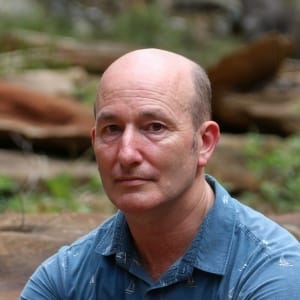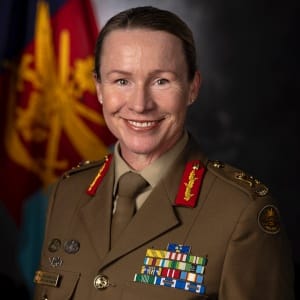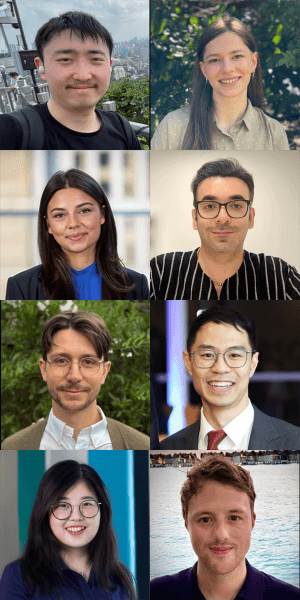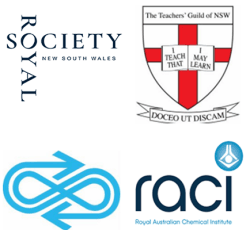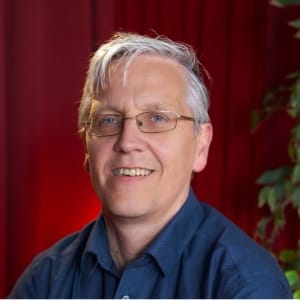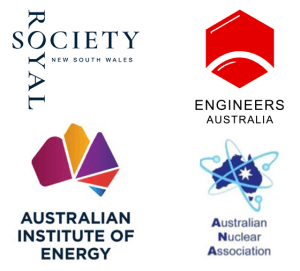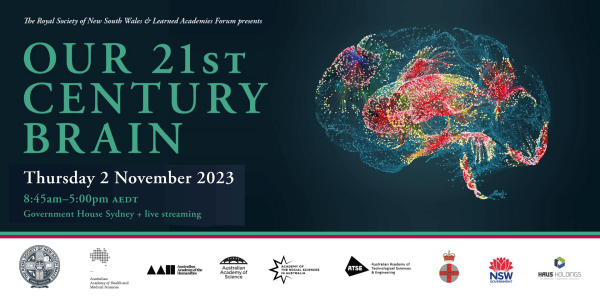
OUR 21st CENTURY BRAIN
Date: Thursday, 2 November 2023, 8.30 for 8.45 am–5.00 pm AEDT
Venue: Live streaming from Government House Sydney
Video presentations: YouTube playlist
Brochures: for the live streamed program — Summary (2.1 MB), Complete Program (6.3 MB)
Summary
The brain underpins our basic instincts and needs, and behavioural responses to the world around us. The brain mediates our compassion, reason, and imagination which are reflected in great works of the arts and sciences. Yet our brain is also the source of distress, dysfunction, and malice. Despite centuries of recurring impacts of tribalism, racism, dehumanisation, and exclusion of ‘outsiders’, we continue to inflict suffering on others.
At the same time, the 21st century brings new challenges that extend well beyond immediate threats to very complex societal challenges such as global security, climate change, massive demographic shifts, resource management, information overload, and artificial intelligence.
Have we reached the edge of our human capacity to respond effectively as either individuals or collective groups?
The context and demands on our brains have been transformed by the very tools we have created, including new information technology platforms, and rapidly developing and deployed forms of artificial intelligence. Diseases of the brain are increasingly prevalent in our ageing population, as are the increasing mental health challenges that are evident across the human lifespan.
Considerable progress across the sciences and humanities has deepened our understanding of genetic, environmental, and social factors that underpin brain development and function. Rising demands on our capacity to respond appropriately to globalised threats bring an urgent need to apply our scientific understanding to the development of just and sustainable solutions.
This year’s Royal Society of New South Wales and Learned Academies Forum focusses on recent progress in unravelling the workings of the brain and opportunities to use our emerging understanding to promote human wellbeing well beyond the 21st Century.
The Forum is held under the auspices of Her Excellency the Honourable Margaret Beazley AC KC, Governor of New South Wales. The Royal Society of New South Wales acknowledges the generous support by Her Excellency, the Academies, the Office of the NSW Chief Scientist and Engineer, and Haus Holdings.
LIVE STREAMED PROGRAM: THURSDAY 2 NOVEMBER 2023 (8.45 AM – 5.00 PM)
<!—->
| Time | |
| 08:30–08:45 | Registration and Guests seated |
| 08:45–10:00 | Official Opening Her Excellency the Honourable Margaret Beazley AC KC |
| Welcome and Acknowledgements Dr Susan Pond AM FRSN FTSE FAHMS
| |
| Keynote Presentations Moderator | |
| Speaker The enigmatic brain: from synapses to neural networksProfessor Lucy Palmer Viertel Senior Medical Research Fellow Florey Institute of Neuroscience and Mental Health University of Melbourne | |
| Speaker via video Lessons from developmental and cognitive neuroscience Dr Joshua Gordon Director National Institute of Mental Health, USA |
SESSION I: THE DEVELOPING MIND
Moderator
Professor Penny Van Bergen
Head, School of Education, Faculty of Arts, Social Sciences and the Humanities
University of Wollongong
William Wordsworth, a British romantic poet, in 1802 used the expression, “The child is the father of the man.” Psychologists have borrowed the poetry to emphasise the outsized influence of early experiences. Speakers in this session will discuss our contemporary understanding of early life influences from 9 months to 25 years on the anatomy and physiology of the brain and the development of human cognitive, emotional, and social capabilities.
| 10:00–11:15 | Professor Adam Guastella Michael Crouch Chair in Child & Youth Mental Health, Sydney Children’s Hospital, Westmead, and The Brain and Mind Centre, Faculty of Medicine and Health University of Sydney |
| Professor Sharynne McLeod FRSN FASSA Professor Speech and Language Acquisition Charles Sturt University | |
| Professor Anne Castles FRSN FASSA ARC Laureate Fellow, Australian Centre for the Advancement of Literacy Australian Catholic University | |
| Associate Professor Kate Highfield Discipline Lead for Early Childhood Education University of Canberra |
BREAK (11:15–11:45)
SESSION II: THE BRAIN—SOCIAL, CULTURAL AND PHILOSOPHICAL PERSPECTIVES
Moderator
Professor Phillipa Pattison AO FRSN FASSA
Emeritus Professor
University of Sydney and University of Melbourne
The human brain has evolved an extraordinarily efficient information storage and processing capacity, arguably in response to the increasing social complexity of human life but is also subject to more immediate environmental influences that are social, cultural, and technological in character. In this session, we consider what we know of these influences and their individual and societal impacts, and what this means for human capability.
| 11:45–13:00 | Professor Andrew Chanen Chief of Clinical Practice and Head of Personality Disorder Research, Orygen Professorial Fellow, Centre for Youth Mental Health, University of Melbourne |
| The Hon. Dr Andrew Leigh MP FASSA (by video) Assistant Minister for Competition, Charities and Treasury, and Federal Member for Fenner in the ACT | |
| Dr Jennifer Kent DECRA and Robinson Fellow, Urbanism Discipline Research Lead University of Sydney School of Architecture, Design, and Planning | |
| Professor Jakelin Troy FASSA Director, Indigenous Research University of Sydney | |
| Professor David Braddon-Mitchell FAHA Discipline of Philosophy, School of Humanities University of Sydney |
BREAK (13:00–14:00)
SESSION III: THE BRAIN DISEASE BURDEN IN ADULTS
Moderator
Professor Anthony Cunningham AO FRSN FAHMS
Director, Centre for Virus Research, Westmead Institute for Medical Research
Vaccine Theme Leader, Sydney Infectious Diseases Institute, University of Sydney
This session will consider two of the major syndromes affecting the brain in adult life, dementia and long COVID, each with physical, psychological, social and economic impacts for the patient, their families, carers, and society. Both have inadequate treatments. Today there are ~400,000 people with dementia in Australia, expected to double by 2060, and it is now the leading cause of death. Long COVID is a multisystem illness, including ‘brain fog’, persisting for weeks or months following COVID infection, often in the mid-adult age group with comorbidities.
| 14:00–15:00 | Professor Glenda Halliday FAA FAHMS NHMRC Leadership Fellow School of Medical Sciences and the Brain and Mind Centre University of Sydney |
| Professor Sharon Naismith Leonard P. Ullman Chair in Psychology and NHMRC Leadership Fellow University of Sydney | |
| Associate Professor Lucette Cysique Cross-disciplinary neurophysiologist St Vincent’s Applied Medical Research Centre — Peter Duncan Neuroscience Unit UNSW Sydney — Kirby Institute and School of Psychology |
SESSION IV: TURBOCHARGING HUMAN INTELLIGENCE WITH ARTIFICIAL INTELLIGENCE
Moderator
Professor Ian Oppermann FRSN FTSE
New South Wales Government Chief Data Scientist and
Industry Professor, University of Technology Sydney
It is argued that one of the major factors that drove the growth in size and complexity of our brains over millennia has been the need to deal with increasingly complex social environments, and increasingly intelligent other members of those social environments – an “arms race” of sorts driven by social interaction. If instead of natural intelligence, we are faced with dealing with increased complexity from the interaction with Artificial Intelligence, what are the changes that we face as humans, and what implications does this have for the long-term development of the human brain?
| 15:00–16:00 | Professor Sally Cripps Director of Technology, Human Technology Institute, and Professor of Mathematics and Statistics University of Technology Sydney |
| Ms Stela Solar Director, National AI Centre CSIRO | |
| Professor Lyria Bennett Moses Associate Dean (Research), Faculty of Law and Justice, and Director, UNSW Allens Hub for Technology, Law and Innovation UNSW (Sydney) |
SESSION V: RAPPORTEUR REMARKS—IMPLICATIONS FOR THE FUTURE
This session aims to bring together the insights emerging from Sessions I-IV and explore their implications for the future. We consider what actions are likely to be necessary, and what Governments and communities need from research and scholarship to take effective action.
| 16:00–17:00 | Professor Ian Hickie AM FRSN FASSA FAHMS NHMRC Senior Principal Research Fellow, Professor of Psychiatry, and Co-Director, Health and Policy, Brain and Mind Centre University of Sydney |


